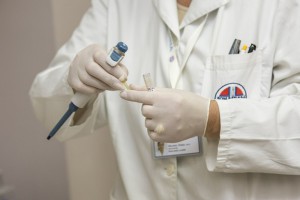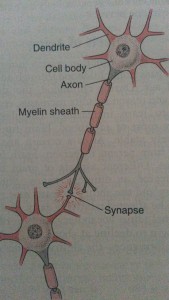Hello Everyone
Today we will discuss a new drug treatment for tinnitus.  These drugs have the potential of helping tinnitus sufferers by working on a pathway that is said to be “malfunctioning” with the brain. What is of further interest is that this drug is said to be effective in people suffering from epilepsy as well.
These drugs have the potential of helping tinnitus sufferers by working on a pathway that is said to be “malfunctioning” with the brain. What is of further interest is that this drug is said to be effective in people suffering from epilepsy as well.
Tinnitus and the Brain
In one of my earlier posts, I have covered the relationship between tinnitus and the brain and touched upon how injury to the brain can bring upon ringing in the ears, which is a characteristic symptom of tinnitus.
Just to briefly recap, after exposure to any injury(e.g loud noise), the brain loses control of pathways, which, if properly regulated, will NOT bring about tinnitus.
So, therefore, it makes sense if we are to find a way to control or regulate these pathways, then we will be able to ‘control’ tinnitus.
The drug that I am going to talk about works on these pathways, more specifically the Potassium Channels. It is still in its infancy stages, but if the FDA(Food and Drug Administration) trials are successful, then it could show promise for tinnitus sufferers around the world.
Introduction to the Nerve Cell
I think it would be easier if I explain a little about the nerve first. Then you would be able to see what the potassium channel is and how it works in relation to the nerves.
So basically, a nerve cell or neuron, consists of a cell body, nerve fibers , one elongated extension called the axon which is responsible for sending impulses, whilst the dendrites, are the branches that receive impulses.
Axons are coated with the Myelin Sheath, which helps nerve impulses to travel faster as compared to nerve cells which do NOT have any sheath.So if the Myelin Sheath of a nerve is damaged, then nerve transmission is impaired or may stop altogether.
What is the Synapse?
Impulses usually travel along the nerves in one direction, from the impulse sending-axon of one nerve cell to the impulse-receiving dendrites of the next nerve cell.
A synapse is a contact point between two nerve cells. The axon release chemical messengers called neurotransmitters into this synapse. These neurotransmitters triggers off the receptors on the next nerve cells dendrites, thereby starting up an electrical current.
Different nerves use different neurotransmitters to convey messages across synapses.If you would like to see how the whole action of nerve transmission works, please watch this video below.
How Neurotransmission Works?(By The ProfessortTed)taken from Youtube.com
Facts about our Amazing Nervous System
- There are 13 500, 000 neurons in the spinal cord,
- There are more nerve cells in the human brain than there are stars in the Milky Way(I think this is debatable),
- When we react to touch or danger, the electrical impulses travel along our nerves at a speed of 280kilometres per hour!!
- Sodium ions and Potassium ions are necessary for the proper functioning of nerves cells
Though our nervous system is an extraordinary complex communication system capable of sending out and receiving large amounts of information at the same time, it is still susceptible to diseases and injuries.
Conditions such as Alzheimer’s and Parkinson’s disease can degenerate nerve cells.Or bacteria and viruses can infect the brain and spinal cord which can cause encephalitis or meningitis.
Are you with me so far? Great, lets move on!!
Axons and Potassium Channels
When an impulse fires, there is a release of Na+ ions (sodium ions) into the synapse. This release causes an electrical current to be formed which fires and allows the message to follow through the nerves. If there is an excess of Na+ ions(sodium ions) released into the synapse then the firing of the current will be for longer than usual.
This continuous firing of the nerve cell causes the nerve to become overly excitable bringing about seizures ( in epilepsy) and ringing noises (tinnitus).
The purpose of the potassium channels is to prevent this electrical potential from firing off for too long. The release of K+(potassium ions) shuts down the Na+ ions (sodium ions)electrical current.
In this way its prevents or minimizes the symptoms of epilepsy and the ringing noises of tinnitus.
In an individual with no tinnitus or epilepsy, the nerve cell is healthy. It has a kick-back or braking system that works optimally to prevent continous firing.
Drugs that work on the potassium channels
An article that was published on June 10 2015, within the Journal of Neuroscience, talks about the use of drugs that acts to enhance the potassium channels in tinnitus sufferers.
It is within the axons that potassium channels or KCNQ are concentrated. KCNQ refers to a class of potassium channels, example KCNQ1, KCNQ2, KCNQ3, KCNQ4 and KCNQ5.
A neurophysiologist, from the University of Connecticut by the name of Anastasios Tzingounis and his colleagues conducted studies on a drug called Retigabine that works on potassium channels.
He found this drug to be effective in putting on the brakes or shutting down the firing of overly excitable nerve cells. But there was a problem.
This drug showed some undesirable side effects such as
- Sleepiness,
- Urination Problems,
- Dizziness and
- Turning people’s skin and eye colour to blue.
One of the reasons for these side effects, is that this drug acts on not just the KCNQ2 and KCNQ3 channels which are the ones most important for tinnitus and epilepsy, but opened the other channels as well.
For this reason it is reserved only for people who did not show any results with other anti-epileptic drugs.
SF0034
Another new drug treatment for tinnitus was called SFOO34 which was developed by a company called SciFlour.
A neurobiologist by the name of Dr Thanos Tzounopoulos, at the University of Pittsburgh who specializes in tinnitus contacted Tzingounis, in 2013 and asked if he would like to do a trial on this new drug.
Chemically, this drug was similar in structure to Retigabine, except that the molecule was modified with an extra Fluorine atom. This modification changed certain characteristics of the drug, but the fundamental purpose of blocking the potassium channels were still evident.
So, does SF0034 show promise or is it worse than its parent drug?
What was great about this drug is that it only acted upon the KCNQ2 and KCNQ3 potassium channels. Because it does not act on the KCNQ4 and KCNQ5 channels, it is more selective over Retigabine. Animal studies showed a decrease in seizures as well. Less toxicity and less side effects was reported from using this drug.
Conclusion
This drug showed some promising results and Sciflour have plans to take the next step. To start with FDA trials on SF0034 to show the safety and effectiveness in people.
This drug would be primarily indicated for epileptic patients but can also provide relief for the people suffering from Tinnitus.
It would be a great breakthrough for the almost 2million people of America who are living with the ringing in their ears.
A quote from Tzingounis,” This SF0034, gives me another tool, a better tool to dissect the function of these channels,” and further says, “We need to find solutions for kids and adults with this problem.”
⇒It sounds strange but I have gained some positive benefits as result of Tinnitus. Read “Tinnitus changes You,”To find out more.⇐
Looks like there is promise and hope. What are your thoughts? Would you try this medication, if it became available to you?
I would love to hear from you.
Please leave me your comments or opinions below.
Thanks for taking the time in reading my article and I hope that you enjoyed the discussion on the potential new drug treatment for tinnitus. Only time can tell on the future of these developments. In the meantime, we keep doing the lifestyle modifications such as diet, exercise, and relaxation therapies.
Most importantly, support is always here for you. So if you ever feel the need to chat, please do not hesitate to contact me.
All the best to you.
Regards
Roopesh

Thank you for the very detailed article regarding tinnitus, how the nerves work and the drugs concerned. My son has suffered for many years with this problem. No current drugs or natural remedies have helped alleviate the condition. Hopefully the trials will be successful and the drug will become available in the near future.
Hi Christine
Thank you very much for sharing.
You are welcome.
I know the feeling that your son is going through at the moment. Have you had a look at the other options that are available for tinnitus management and treatment that I have suggested on this site.
Please feel free to check out lifestyle modifications, natural therapies, and diet changes that are I talk about. Maybe there is something that can work in the interim.
I will certainly keep you updated on any further information regarding this drug.
Everything of the best to you and your son.
Regards
Roopesh
After reading your post I realize that there is here is promise and hope for those who suffer from tinnitus. You have a very informative post that covers all the information that someone who suffers from tinnitus must have in order to inform themselves and make the most informative decision. Thank you for sharing.
Hi Juan
Yes, there is certainly hope and promise and that is always a good sign.
I feel that information must always be shared, especially if it is to benefit people. The more people that we can help, the better.
Thanks for reading
Regards
Roopesh
After all the side effects you mentioned with the first drug, it makes me wonder, “Which is worst, suffering from tinnitus or suffering from all those other side effects?”
It’s comforting to know that the new drug has done better. You mentioned the new drug has less side effects. How much less? And what are your resources for this information of data?
Do you have any experience with any of these drugs personally?
Hi Jason
The sad part is that side effects are associated with almost every drug. So, there is no way of really escaping that part. However, different people will react differently to the same drug.
Because this article has been published in the journal and is a study, these are the only reported side effects of the drugs in question. Unfortunately, no other data is available as yet.
Personally I have no experience with any of these drugs.
Thanks for the questions
All the best
Roopesh
What an interesting article. I am the one with such a problem, and I realized that some people from work have the same issue. You write about 2 million people in America suffering from it. But the drug you discuss has some extra effects, as you said on epilepsy as well. So this part is a bit worrying for me. Who knows what else it may impact. Later you say that SF0034 would be indicated for epileptic patients. So my understanding this is not for me, am I right?
Hi Jovo
Thanks for your comment.
Glad you found this article interesting.
Drugs in general all have side effects. Some are minor and others can be very bothersome or dangerous. It is only natural to worry , so I understand exactly where you are coming from.
This is the very reason, that trials are conducted to test the safety profile of the drug in question.
Regarding the SF0034, yes it is showing promise in epileptic patients but it also showed its mechanism to work on pathways within tinnitus sufferers.
I personally would try this drug, if it become available into the market.
Hope this answers your question.
Regards
Roopesh
Wow, thanks! I’ve had a slight ringing in my ears for as long as I can remember, and this website might have just solved my mystery. Though I’ve never considered serious drug treatment, I’m glad to know there are cutting-edge options out there if I ever choose to go that direction. Thanks again!
Hi There
Glad that I could be of some assistance.
The drug treatment are still in their testing phases. Lets see over time if they will see the light of day.
Cheers
Roopesh
It’s a noble deed to commit yourself in the quest of acquiring knowledge to help people who are suffering from tinnitus. The information in this article is very well put together. It makes it easy for the common man to understand the underlying problems and also to find out about possible remedies and treatments. Great post!
Hi Farhan
Thank you very much for the lovely words.
It really does mean a lot to me. At the end of the day, if I can help just one person suffering from tinnitus, then this site would have served its purpose.
Have a great day.
Roopes
Do you have a mailing list to receive new articles? If so I’d like to be on it.
Hi Frances. Thanks for that. Working on it. As soon as it is up and running will give you a shout.
Thank you so much for this article.
As of 2/13/17 do you have any new info on the tinnitus drug? Did they do the trial and how long would it be before it is available. Months? Years?
Thanks!
Hey Nick
You are most welcome. Thanks for stopping by.
At this point, nothing concrete. As soon as I hear anything, I will blog about it and keep you informed.
Regards
Roopesh
I too have been or trying to follow the progress of this drug but no new information seems to have been made available since the original articles in 2015.
Any new information or has the drug/trials been completely abandoned at this point?
James
Hey James
Will follow up this week and see what news I can get for you?
Let’s hope that there is something good in the works
Will be in touch
I have tinnitus, so I am greatly interested in this drug SFOO34. Can you please tell me if there’s any new information.
Thank you ,
Carole Fredrickson
Hi Carole
Absolutely, as soon as I get more information,you will be the first to know.
Regards
Roopesh
I have epilepsy. I have recently developed tinnitus,I take Dilantin for seizures. I would like to hear about the drug you have been doing trials with. I have learned to live with both diseases but would love to be able to control them better. Any information would be appreciated. Thank you.
Hello Mark
Hope that you are well?
I think that that trial has already taken place awhile back. But I will definitely keep in touch with you, should anything else comes up.
Regards
Roopesh
I had an acoustic neuroma and prior to my surgery in 2016 I had tinnitus. It is worse now and I’ve had about 4 vagal responses sending me to the er. At times it is so loud I can’t hear anyone or even tv unless up loud. Due to the surgery I am completely deaf in my right ear. I can gently lay my fingers on my neck, left side long enough to fall asleep. Is there anything holistically to do? More water, potassium, acupuncture, diet, etc… It drives me crazy!
Thank you for the article.